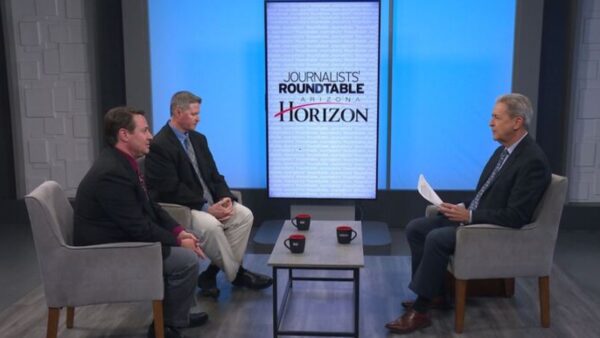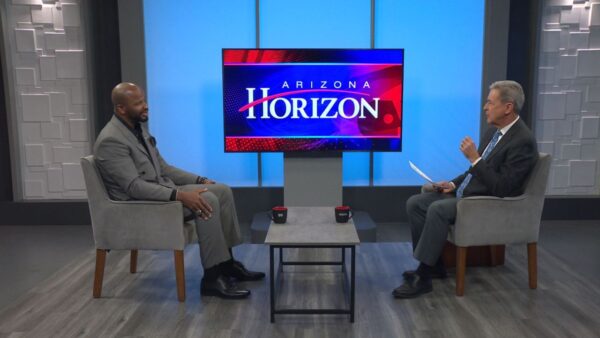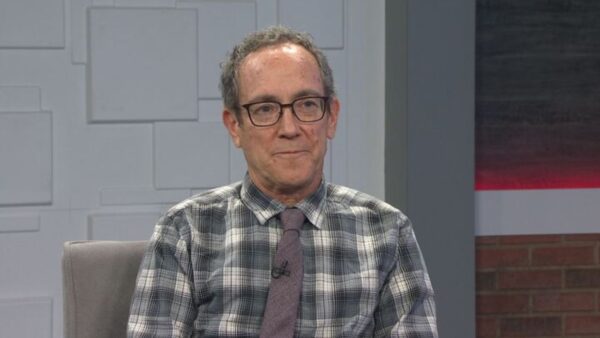Screenings will be held in Phoenix and Tucson for three films to celebrate the Grand Canyon and highlight the need for a new national monument near the Canyon. Sandy Bahr, chapter director of the Sierra Club Grand Canyon Chapter, will talk about the films, the canyon and the proposed monument.
Ted Simons: Film screenings are set to be held in Phoenix and Tucson for three films that celebrate the Grand Canyon and highlight what promoters say is the need for a new national monument near the Canyon.
Video: Old growth forests are critical for a number of reasons. One is that they comprise some of the most resilient environments, things that can rebound from fires, can rebound from drought and given the issue of climate change, the crisis that we're enduring now, this sky island of ponderosa and mixed conifer, is surrounded by desert and becomes very critical to protect and maintain the species that are found here, that are unique here.
Video: A river trip, it is a microcosm of life.
Video: It's mind expanding for sure. ¶¶
Video: He would get in the situations that would kill a normal person.
Video: He just looked the part.
Video: For the first time ever, rode a boat through the Grand Canyon, I couldn't get enough of it.
Video: He saw the emergence of this enormous reservoir.
Video: He stood up and said no.
Video: If Martin hadn't been around, we would be 100 feet underwater right now.
Video: One of the last great warriors.
Video: Nature is the common language that we have as human beings. ¶¶ ¶¶ And it's something that we often have to reconnect to.
Video: Before we had any Bibles, before we had any books. This was our education.
Ted Simons: Here now to discuss the screenings and update the move for a Grand Canyon watershed national monument is Sandy Bahr of the Sierra Club's Grand Canyon chapter. Good to see you, thanks for joining us. Why are these films featured?
Sandy Bahr: Well, these films are featured because they showcase the land around the Grand Canyon, they're important both from just their natural beauty but also what they mean to people. The land we defend includes seven veterans and why the public lands are important to them and how it's been part of their coming home process after being in various wars. And then they talk about mostly the north Kaibab has a number of artists but also high school kids who haven't been out in the wilderness before and then Martin's boat is about Martin litten and Martin is kind of a legend. He was a strong conservationist and really was instrumental in making sure the dams, the additional dams they wanted to build in the Grand Canyon were not built and in the clip you saw they talked about well this would have been underwater and that's true. That marvel canyon area.
Ted Simons: This is all to highlight the need for a national monument. Let's talk about the monument, we've had debates on this on this program before and we'll get a little bit into that but I do want to talk about exactly why -- representative Grijalva will be down there for the screenings, in Tucson?
Sandy Bahr: Congressman Grijalva will be at the loft screening on Saturday and he's introduced a bill to establish the greater Grand Canyon heritage national monument. And this will protect what are already public lands as a national monument north and south of Grand Canyon national park.
Ted Simons: And critics, we've had them on the show and they have been emphatic that this would do a lot of harm and do more harm than good starting with just drastically reducing public access to this area. Public access a factor here? Does it concern you?
Sandy Bahr: It doesn't concern me at all and, you know, they're incorrect and they're promoting some very misleading information. The monument, if you read Congressman grijalva's bill, it specifically states things like hunting and fishing will continue, that the Arizona game and fish department will continue to have its role, they have a seat on the advisory committee that will determine the management for the monument. The key issues that we want to address with the national monument are protecting it from uranium mining and doing that permanently and that's true. So if they're arguing for uranium mining and saying that it will hinder that, they're correct. And then also there are some of our best old growth ponderosa pines are up on the north Kaibab. We would like to see those protected. We don't have very much left.
Ted Simons: Back to the uranium mining, there was the Arizona wilderness act of 1984 which was a compromise that allowed certain things to be protected but also allowed for -- it's called low impact uranium mining. I'm not sure exactly what that is but they say that it's up there, it's working now. Make it a monument, and that blows this whole compromise, this whole agreement out of the water. Do they have a point?
Sandy Bahr: No. There was never a compromise to say that no one would ever try to protect additional land. The bill protected some lands as wilderness. The national monument does not protect those lands as wilderness. It does provide protection for what they call the objects of the monument. Objects of the monument would be cultural sites, there are over 3,000 that we know of, probably many more, help to protect important species like California condor. So it doesn't establish it as a wilderness. It does provide additional protection and it does make permanent the mining ban that's in place right now but that's just temporary. And low impact uranium mining, I'm not sure where they came up with that but we have uranium mines up there that are contaminating the surrounding lands and waters. We know there are elevated levels in areas where there's been uranium mining. One of the mines up there right now, the pine nut mine, did not get its air quality permit, it's been put on hold because it had contamination, elevated levels outside the fence area. So the mines have not been reclaimed, there's an old mine right in Grand Canyon national park that continues to contaminate the waters of Grand Canyon. And the American public, the taxpayers are picking up the tab for that.
Ted Simons: One last point on this. They say as far as, you know, forest resource management, wildlife resource management, again, lack of access in particular but in general, that management would suffer if this becomes a monument. Do they have a point?
Sandy Bahr: No. First of all, if you look at the monuments that were established under president Clinton, the hunting and fishing all continue. There continues to be access. What does happen is cultural sites are better protected. Agua Fria National Monument was a huge issue and a lot of archeologists and people who were concerned about cultural resources promoted that. We have some of the same issues with this. People will be able to and if you -- if people come to the film, they will see the kinds of activities, a variety of activities that people can engage in. This is actually a way to protect the reactional values because frankly, I mean when you don't have public land, you have limited access. That's what we see with a lot of places out east.
Ted Simons: So again, this is going to be at the loft cinema in Tucson Saturday correct?
Sandy Bahr: Correct and here in Phoenix on April 14th, next Thursday over at the film bar in Phoenix.
Ted Simons: Good to have you here, thanks for joining us.
Sandy Bahr: Thanks.
Sandy Bahr: Sierra Club Grand Canyon's chapter




















